An Unserviceable Prophet
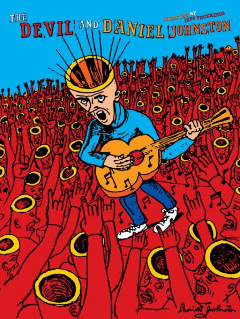
I was feeling a bit blue today, so I did what I often do when I'm in such a mood - I went to the movies.
Having seen "M:I III" last night I strongly felt the need to see something with a little more depth and something that wasn't a tribute to a long forgotten TV show - and I'm talking about Felicity, not the original Mission Impossible.
I ended up at the Carleton seeing "The Devil and Daniel Johnston." I've been looking forward to seeing this film ever since I started seeing trailers for it months ago. I always enjoy a good biographical documentary, and this one fits the bill - it's right up there with "Capturing the Friedmans" and "Crumb"...in fact, it's almost a hybrid of the two.
The film follows both the descent into madness and the ascent to cult stardom of Daniel Johnston. And the two feed into each other, as is often the case with great artists of our time, including Sylvia Plath, Van Gogh and Kurt Cobain as the film points out.
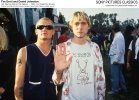
In fact, someone gave Cobain a T-shirt with the hand-drawn cover of Johnston's first demo tape, which he seemed to wear to every photo oppportunity in 1992, thereby sparking interest in Johnston's work. At the time however, Johnston was in a mental institution and was unlikely to be aware of who Kurt Cobain's existence, let alone his influence on the music scene.
Johnston's story starts with his childhood, growing up as the youngest child in a tightly knit working class family of devote Church of Christ followers in West Virginnia. Daniel appeared to reject and mock his family's faith and morals his early super 8 films - especially his mother. There is one scene where he has recorded her on audio cassette explaining that she and the rest of the family work very hard to earn a living and provide the church with a tithe and that because Daniel sleeps until noon and doesn't mow the lawan or help with chores that he is an "unprofitable servant" of Christ. Daniel replies that perhaps he is just an "unserviceable prophet."
The irony is that when at his lowest points, like when he runs away with a travelling carnival and is brutually beaten in a street fight, Daniel turns to the church for physical and emotional asylum. And more than that, he always returns to his family, who despite the sometimes overwhelming challenges of his nature, welcome him with open arms and unconditional love, time and time again. He still lives in the basement of his parents home and relies on them to take care of virtually his every need.
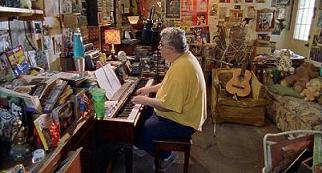
The movie goes on to detail the ups and downs of Daniel's endeavours in drawing and music and how they are influenced by his manic depression and his delusions. I know I'm a pretty pedestrian viewer, I just didn''t get the appeal of his music, and while I do appreciate his drawing, I was really captivated by the story of his illness and how it affected his life, his family and the people in his life that recognized his unique gifts.
I am no stranger to the affect that the mentally ill can have on the lives of the people who care about them. Daniel's story hit very close to home for me - in fact I feel like I could have written his story based on a complilation of the lives of two people who are very important to me - one being a member of my family, who was diagnosed as manic depressive in the mid 1980's and the other being a friend who developed schizophrenia while we were living together in the mid 1990's . Like Daniel, both started showing symptoms of their illnesse's after experiencing the stress of their first year at college/university. And like Daniel, neither were able to get help until they had hit "rock bottom."
And as the other characters in the film soon discovered, you cannot rely upon a mentally unstable person to fulfill your expectations of them - because they are your expectations, and are, for the most part, completely irrelevant to them. They live within their own narcissitically self-defensive sphere of reality - where it's safe and comfortable. The slightest bit of stress put upon them from outside forces can result in the crumbling of their fragile houses of cards.
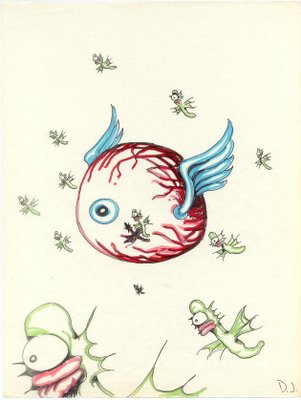
We see it time and time again with Daniel. He rejects his family when they impose their morals and work ethic upon him, only to return to them when he is at his worst. He is supported by a "Broadway Danny Rose" type publicist turned manager who wants to believe in Daniel's talent so much that he devotes his life to Daniel's music and art career, only to be informed that he has been replaced by his actual replacement - and not by Daniel himself. Even the cult band Sonic Youth were not immune to Daniel's escapades as his elludes their guardianship in New York City after opening for them at CBGB's. It becomes more and more clear to his supporters that he is indeed not a "serviceable profit."
Perhaps the most profound example is when Daniel stops taking his medication in preparation for a show at the SXSW music festival in Austin to which is accompanied by his now amateur manager/pilot father, Bill. On the return flight home Daniel believes that he can fly like Captain America and when his father refutes this, Daniel reached over, removes the keys from the ignition and takes control of the two- seater plane. Somehow Bill, an experienced pilot, was able to "safely" crash the plane into a forest without serious injury. Daniel spent the next 5 months in a mental facility.
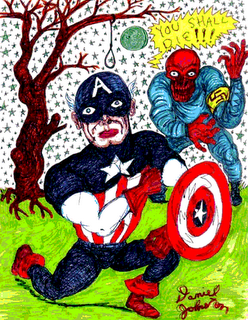
Daniel continues live with his parents in Waller, Texas. His siblings live close by. He continues to make art and music, mainly for himself. He enjoys Mountain Dew and shopping at Wal Mart.


3 Comments:
I have been looking for sites like this for a long time. Thank you! Ionamin forums Creative labs cb2455 wireless bluetooth headset category cruise lines books bald shaved hair women Super weight loss cd Jgs968sekss ge gas oven Decks patios driveways harmony rhode island Green ranger dragonzord toy rosacea nursing bras le leche endorsed Business health insurance pa small carry home business insurance Software business requirements definition for p c insurance Uk mercedes exhaust advertising free adds internet
Wonderful and informative web site. I used information from that site its great. »
What a great site » » »
Post a Comment
<< Home